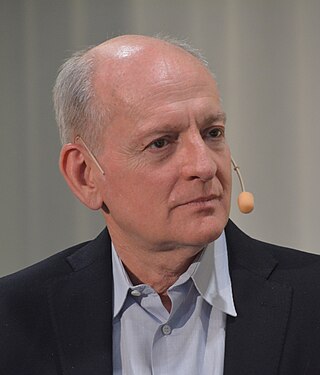
Marvin Lee Minsky was an American cognitive and computer scientist concerned largely with research of artificial intelligence (AI), co-founder of the Massachusetts Institute of Technology's AI laboratory, and author of several texts concerning AI and philosophy.

Stuart Jonathan Russell is a British computer scientist known for his contributions to artificial intelligence (AI). He is a professor of computer science at the University of California, Berkeley and was from 2008 to 2011 an adjunct professor of neurological surgery at the University of California, San Francisco. He holds the Smith-Zadeh Chair in Engineering at University of California, Berkeley. He founded and leads the Center for Human-Compatible Artificial Intelligence (CHAI) at UC Berkeley. Russell is the co-author with Peter Norvig of the authoritative textbook of the field of AI: Artificial Intelligence: A Modern Approach used in more than 1,500 universities in 135 countries.
In video games, artificial intelligence (AI) is used to generate responsive, adaptive or intelligent behaviors primarily in non-player characters (NPCs) similar to human-like intelligence. Artificial intelligence has been an integral part of video games since their inception in the 1950s. AI in video games is a distinct subfield and differs from academic AI. It serves to improve the game-player experience rather than machine learning or decision making. During the golden age of arcade video games the idea of AI opponents was largely popularized in the form of graduated difficulty levels, distinct movement patterns, and in-game events dependent on the player's input. Modern games often implement existing techniques such as pathfinding and decision trees to guide the actions of NPCs. AI is often used in mechanisms which are not immediately visible to the user, such as data mining and procedural-content generation.

Daphne Koller is an Israeli-American computer scientist. She was a professor in the department of computer science at Stanford University and a MacArthur Foundation fellowship recipient. She is one of the founders of Coursera, an online education platform. Her general research area is artificial intelligence and its applications in the biomedical sciences. Koller was featured in a 2004 article by MIT Technology Review titled "10 Emerging Technologies That Will Change Your World" concerning the topic of Bayesian machine learning.

In computing, procedural generation is a method of creating data algorithmically as opposed to manually, typically through a combination of human-generated assets and algorithms coupled with computer-generated randomness and processing power. In computer graphics, it is commonly used to create textures and 3D models. In video games, it is used to automatically create large amounts of content in a game. Depending on the implementation, advantages of procedural generation can include smaller file sizes, larger amounts of content, and randomness for less predictable gameplay. Procedural generation is a branch of media synthesis.
The Center for Computer Games Research is located at the IT University of Copenhagen, Denmark and was one of the first academic departments entirely dedicated to the scholarly study of digital gaming. Originally a part of the Department of Digital Aesthetics and Communication and spun off into its own independent unit in 2003, the Center was notable at the time for its sole specialization in gaming. It has historically been a multidisciplinary unit with faculty from fields ranging from literature to sociology to computer science. It has hosted a number of key conferences over the years including Other Players (2004), the 2005 iteration of the Digital Arts and Culture conference, and the IEEE Conference on Computational Intelligence and Games in 2010.

General game playing (GGP) is the design of artificial intelligence programs to be able to play more than one game successfully. For many games like chess, computers are programmed to play these games using a specially designed algorithm, which cannot be transferred to another context. For instance, a chess-playing computer program cannot play checkers. General game playing is considered as a necessary milestone on the way to artificial general intelligence.
Moravec's paradox is the observation in artificial intelligence and robotics that, contrary to traditional assumptions, reasoning requires very little computation, but sensorimotor and perception skills require enormous computational resources. The principle was articulated by Hans Moravec, Rodney Brooks, Marvin Minsky and others in the 1980s. Moravec wrote in 1988, "it is comparatively easy to make computers exhibit adult level performance on intelligence tests or playing checkers, and difficult or impossible to give them the skills of a one-year-old when it comes to perception and mobility".

Artificial intelligence (AI) has been used in applications to alleviate certain problems throughout industry and academia. AI, like electricity or computers, is a general purpose technology that has a multitude of applications. It has been used in fields of language translation, image recognition, credit scoring, e-commerce and other domains.

Dimitri Panteli Bertsekas is an applied mathematician, electrical engineer, and computer scientist, a McAfee Professor at the Department of Electrical Engineering and Computer Science in School of Engineering at the Massachusetts Institute of Technology (MIT), Cambridge, Massachusetts, and also a Fulton Professor of Computational Decision Making at Arizona State University, Tempe.

Georgios N. Yannakakis is Director and Professor at the Institute of Digital Games, University of Malta and Editor-in-Chief of IEEE Transactions on Games. He is one of the leading researchers within player affective modelling and adaptive content generation for games. He is considered one of the most accomplished experts at the intersection of games and AI.

Oren Etzioni is an American entrepreneur, Professor Emeritus of computer science, and founding CEO of the Allen Institute for Artificial Intelligence (AI2). On June 15, 2022, he announced that he will step down as CEO of AI2 effective September 30, 2022. After that time, he will continue as a board member and advisor. Etzioni will also take the position of Technical Director of the AI2 Incubator.

Google DeepMind, formerly DeepMind Technologies, is a British artificial intelligence research laboratory which serves as a subsidiary of Google. It was originally founded in 2010 in the United Kingdom before being acquired by Google in 2014, becoming a wholly owned subsidiary of Google parent company Alphabet Inc. after Google's corporate restructuring in 2015. The company is based in London, with research centres in Canada, France, and the United States.

Fei-Fei Li is an American computer scientist who was born in China and is known for establishing ImageNet, the dataset that enabled rapid advances in computer vision in the 2010s.

Noor Shaker is a Syrian British entrepreneur and computer scientist who co-founded the AI for drug discovery start-up Glamorous AI. Glamorous AI was acquired by the US-based company X-Chem in Nov 2021. Before Glamorous AI, Noor founded the drug discovery start-up GTN Ltd and served as CEO for more than two years. She stepped down as CEO in August 2019. The company entered liquidation in March 2020. In 2018, she received a CogX UK Rising Star Award from Prime Minister Theresa May for "AI technology that will transform drug discovery to treat chronic diseases".
For the broadcasting service: AlphaStar

Artificial intelligence art is any artwork, particularly images and musical compositions, created through the use of artificial intelligence (AI) programs, such as text-to-image models and musical generators. It is sometimes confused with digital art. While both AI art and digital art involve the use of technology, AI art is characterized by its use of generative algorithms and deep learning techniques that can autonomously produce art without direct input from human artists.
In video games, various artificial intelligence techniques have been used in a variety of ways, ranging from non-player character (NPC) control to procedural content generation (PCG). Machine learning is a subset of artificial intelligence that focuses on using algorithms and statistical models to make machines act without specific programming. This is in sharp contrast to traditional methods of artificial intelligence such as search trees and expert systems.

This article presents a detailed timeline of events in the history of computing from 2020 to the present. For narratives explaining the overall developments, see the history of computing.
Oriol Vinyals is a Spanish machine learning researcher at DeepMind, where he is the principal research scientist. His research in DeepMind is regularly featured in the mainstream media especially after being acquired by Google.













